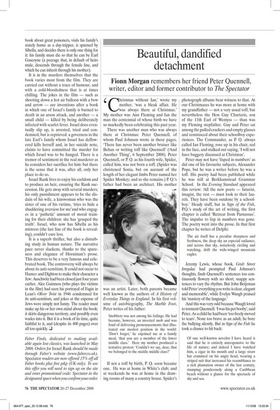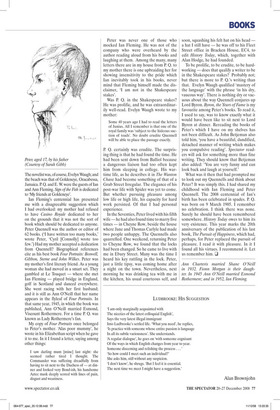Beautiful, dandified detachment
Fionn Morgan remembers her friend Peter Quennell, writer, editor and former contributor to The Spectator ‘Christmas without Ian,’ wrote my mother, ‘was a bleak affair. He was always there at Christmas.’ My mother was Ann Fleming and Ian the man the centennial of whose birth we have so markedly been celebrating this past year.
There was another man who was always there at Christmas: Peter Quennell, of whom Paul Johnson wrote in these pages, ‘There has never been another bruiser like Behan or writing toff like Quennell’ (‘And Another Thing’, 6 September 2008). Peter Quennell, or P. Q. as his fourth wife, Spider, called him, was not born a toff. (Spider was christened Sonia, but on account of the length of her elegant limbs Peter named her Spider Monkey; and so she remains.) P. Q.’s father had been an architect. His mother was an artist. Later, both parents became well known as the authors of A History of Everyday Things in England. In his first volume of autobiography, The Marble Foot, Peter writes of his father:
Snobbery was not among his failings. He had become, however, an inverted snob and was fond of delivering pronouncements that illustrated our modest position in the world: ‘Don’t forget,’ he enjoined me at a family meal, ‘that you are a member of the lower middle class.’ Here my mother produced a tentative protest: ‘Couldn’t we say, dear, that we belonged to the middle middle class?’
If not a toff by birth, P. Q. soon became one. He was at home in White’s club; and at weekends he was at home in the drawing rooms of many a country house. Spider’s photograph albums bear witness to that. At our Christmases he was more at home with my grandfather — not a very usual toff, but nevertheless the Hon Guy Charteris, son of the 11th Earl of Wemyss — than was my Fleming stepfather. Guy and Peter sat among the pulled crackers and empty glasses and reminisced about their schoolboy experiences. The Commander, as P. Q. always called Ian Fleming, rose up in his chair, red in the face, and stalked out saying, ‘I will not have buggery discussed at Christmas’.
Peter may not have ‘lisped in numbers’ as did one of his favourite subjects, Alexander Pope, but he was a writer before he was a toff. His poetry had been published while he was still at Berkhamstead Grammar School. In the Evening Standard appeared this review: ‘All the new poets — futurist, imagist, the rest — must look to their laurels. They have been outdone by a schoolboy.’ Heady stuff, but in Sign of the Fish, P.Q.’s study of the art of writing, the first chapter is called ‘Retreat from Parnassus’. The impulse to lisp in numbers was gone. The poetry went into the prose. In that first chapter he writes of Delphi:
The air itself has a peculiar sharpness and freshness, the deep sky an especial radiance; and across that sky, noiselessly circling and watching, drift the wide-winged mountain eagles.
Jeremy Lewis, whose book, Grub Street Irregular, had prompted Paul Johnson’s thoughts, finds Quennell’s sentences too continuously flowery with no short, snappy sentences to vary the rhythm. But John Betjeman told Peter ‘everything you write is clear, elegant and memorable’, while Evelyn Waugh praised his ‘mastery of the language.’ And this was very odd because Waugh loved to torment Quennell. ‘I was his pet booby’, said Peter. As a child he had been ‘too freely moved to tears’. None too brave as an adult, he bore the bullying silently. But in Sign of the Fish he took a chance to hit back:
Of one well-known novelist I have heard it said that he is entirely unresponsive to the life of nature; and indeed I have watched him, a cigar in his mouth and a large straw hat crammed on his angry head, wearing a striped suit that increased his resemblance to a rich plantation owner of the last century, stumping ponderously along a Caribbean beach without a glance for the spectacle of sky and sea.
The novelist was, of course, Evelyn Waugh; and the beach was that of Goldeneye, Oracabessa, Jamaica. P. Q. and E. W. were the guests of Ian and Ann Fleming. Sign of the Fish is dedicated to ‘My friends at Goldeneye’.
Ian Fleming’s centennial has presented me with a disagreeable suggestion which I had overlooked: my mother had refused to have Casino Royale dedicated to her on the grounds that it was not the sort of book which should be dedicated to anyone. Peter Quennell was the author or editor of 62 books. (‘I have written too many books,’ wrote Peter, ‘Cyril [Connolly] wrote too few.’) Had my mother accepted a dedication from Quennell? Biographical references cite as his best book Four Portraits: Boswell, Gibbon, Sterne and John Wilkes. Peter was my mother’s first literary friend. As a young woman she had moved in a smart set. They gambled at Le Touquet — where she met Ian Fleming — played bridge in England, golf in Scotland and danced everywhere. She went racing with her first husband; and it is still as Ann O’Neill that her name appears in the flyleaf of Four Portraits. In that same year, 1945, in which the book was published, Ann O’Neill married Esmond, Viscount Rothermere. For a time P. Q. was known as Lady Rothermere’s fan.
My copy of Four Portraits once belonged to Peter’s mother. ‘Alas poor mummy’, he wrote in his Elizabethan script when he gave it to me. In it I found a letter, saying among other things:
I saw darling mum [mine] last night: she seemed rather tired I thought. The Commander was suffering dreadfully from having to sit next to the Duchess of — at dinner and looked very Bond-ish, his handsome Aztec mask deeply scored with lines of pain, disgust and weariness.
Peter was never one of those who mocked Ian Fleming. He was not of the company who were overheard by the author reading aloud from his books and laughing at them. Among the many, many letters there are in my house from P. Q. to my mother there is one upbraiding her for showing insensitivity to the pride which Ian inevitably took in his books, never mind that Fleming himself made the disclaimer, ‘I am not in the Shakespeare stakes’.
Was P. Q. in the Shakespeare stakes? He was prolific, and he was extraordinarily well-read. Evelyn Waugh wrote to my mother:
Some 40 years ago I had to read the letters of Junius. All I remember is that one of the royal family was ‘subject to the hideous suction of toads’. No doubt erudite Quennell will be able to place the passage exactly.
P. Q. certainly was erudite. The surprising thing is that he had found the time. He had been sent down from Balliol because a dangerous liaison had too often kept him from sleeping in college. His wartime life, as he describes it in The Wanton Chase had become something of that of a Grub Street Irregular. The elegance of his post-war life with Spider was yet to come. But whether pursuing pleasure among low life or high life, his capacity for hard work persisted. Of that I had personal experience.
In the Seventies, Peter lived with his fifth wife — he had also found time to marry five times — in Cheyne Row, beside the house where Jane and Thomas Carlyle had made two people unhappy. The Quennells also quarrelled. One weekend, returning Peter to Cheyne Row, we found that the locks had been changed. So he came to live with me in Ebury Street. Many was the time I heard his key rattling in the lock. Peter, just a little tipsy, was coming home after a night on the town. Nevertheless, next morning he was drinking tea with me in the kitchen, his usual courteous self, and soon, squashing his felt hat on his head — a hat I still have — he was off to his Fleet Street office in Bracken House, EC4, to edit History Today, which, together with Alan Hodge, he had founded.
To be prolific, to be erudite, to be hardworking — does that qualify a writer to be in the Shakespeare stakes? Probably not; but there is more to P. Q.’s writing than that. Evelyn Waugh qualified ‘mastery of the language’ with the phrase ‘in his dry, vaucous way’. There is nothing dry or vacuous about the way Quennell conjures up Lord Byron. Byron, the Years of Fame is my favourite among Peter’s books. To read it, I used to say, was to know exactly what it would have been like to sit next to Lord Byron at dinner. Rereading the books of Peter’s which I have on my shelves has not been difficult. As John Betjeman also told him, ‘you have a beautiful, dandified, detached manner of writing which makes you compulsive reading’. Spectator readers will ask for something more than fine writing. They should know that Betjeman also added: ‘You are very funny and can look back and laugh at yourself.’ What was it then that had prompted me to look out my Quennells and think about Peter? It was simply this. I had shared my childhood with Ian Fleming and Peter Quennell. The 2008 centennial of Ian’s birth has been celebrated in spades. P. Q. was born on 9 March 1905. I remember no celebration. I think there was none. Surely he should have been remembered somewhere. History Today owes to him its very existence. This year marks the 20th anniversary of the publication of his last book, The Pursuit of Happiness, which had, perhaps, for Peter replaced the pursuit of pleasure. I read it with pleasure. In it I found all his virtues. I recommend it. Let us remember him. ❑























































































































 Previous page
Previous page